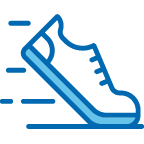Stay hydrated in the spring and summer heat

At a glance
- Being even slightly dehydrated during exercise can make a significant difference in how you perform
- Thirst is not an accurate indicator of hydration status, so be fully hydrated before exercise
- For activities lasting over an hour, be sure to replenish your electrolytes after your workout
The spring and summer sunshine gives people living in the Pacific Northwest the perfect excuse to get outside. Plus, exercising outside can boost your mood and help you stay fit and healthy.
Dehydration, however, can cramp your fitness plans. It turns out what you drink can be as important as what you eat.
An adult athlete’s body is 40 to 70 percent water. Adequate hydration is essential for delivering nutrients and removing waste products. Being even slightly dehydrated during a workout can make a significant difference in how you feel and how well you perform.
Water plays a critical role in cooling the body during exercise. Fluid losses during exercise via respiration and sweat can be significant, especially as the weather warms up and training intensifies. Training at altitude also increases fluid losses.
Thirst is not an accurate indicator of hydration status. Thirst kicks in at 2-3 percent dehydration, but performance is affected at 1-2 percent dehydration. Even mild dehydration makes exercise feel harder, which impairs performance. The goal is to be fully hydrated before beginning exercise, and then replace fluid losses as they occur.
For activities lasting less than an hour, water is the best way to hydrate. For workouts or activities lasting longer than an hour, especially in the heat, it’s important to replenish electrolytes as well. This can be accomplished by including salty foods or electrolyte beverages along with your water.
Getting the timing right can help you stay hydrated before, during and after your workout.
Before your workout
Ideally, you should consume 16 ounces of fluid two hours before exercise. This allows your body time to absorb the water and eliminate any excess before you begin.
During your workout
Aim to drink five to 10 ounces of fluid (roughly three to six “gulps” from your water bottle) every 15 to 20 minutes during exercise (15 to 40 ounces per hour).
After your workout
Drink enough fluids to restore any weight lost during exercise. One pound of body weight equals 16 ounces of fluid. If you weigh yourself (without clothing) before and after exercise, you should replenish with 16 ounces of fluid for each pound lost.
It can be difficult to carry and/or consume enough fluids to maintain optimal hydration during your workouts, so be sure to start out well hydrated and rehydrate as soon as possible following exercise.
Editor’s note: This article was originally published in May 2014 and updated in May 2021.




